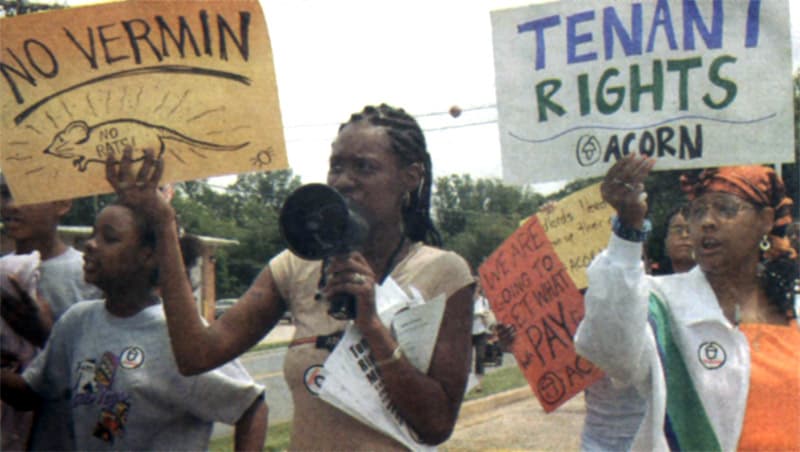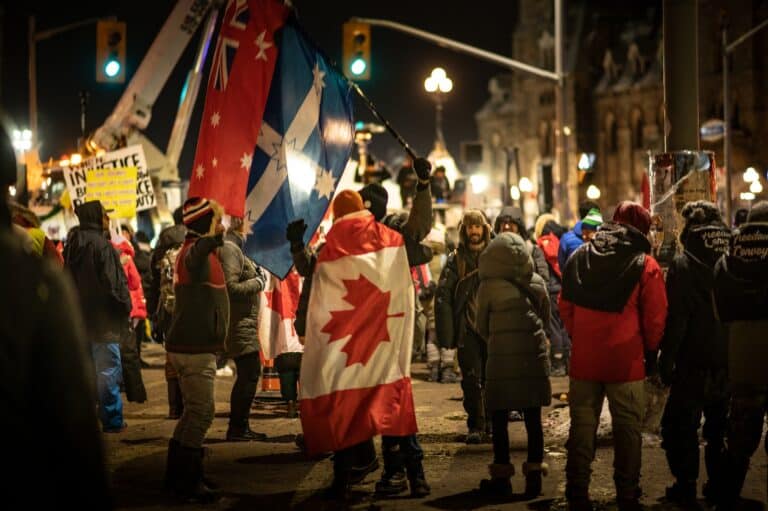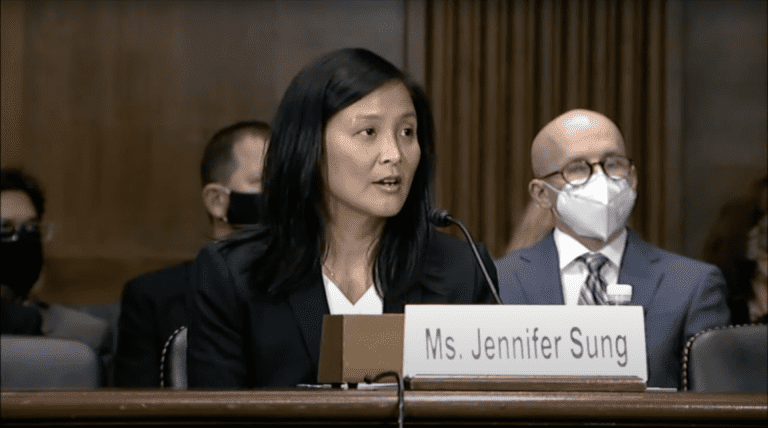Luca Greco is a student at Harvard Law School and a member of the Labor and Employment Lab.
The looming eviction crisis that had been avoided by the federal eviction moratorium is expected to come crashing down on tenants soon. Some states and cities have warded off the cataclysmic evictions that were expected by rendering evictions more difficult or by imposing their own moratoriums. Many of those moratoriums, however, are either expiring or facing legal challenges, and so far have only served to delay the inevitable. It is a matter of time before the eviction crisis strikes, with 27% of Americans facing serious problems paying their rent. In the face of this impending disaster, unions can and should step up to fight for protections for their members and workers around the country as they have done in the past.
The Past
The labor movement has a long history of fighting for affordable housing in the United States, with the greatest successes in New York City. Beginning as early as the 1920s with worker cooperatives, organizations like Amalgamated Clothing Workers of America funded the construction of affordable housing for hundreds of families in New York. While most high-income housing cooperatives around the country failed during the Great Depression, the affordable coops, including those sponsored by unions, survived and were able to provide housing throughout the economic crisis.
In the same period, figures like Catherine Bauer, an author and activist, elevated the voices of workers to fight for the construction of affordable housing, eventually putting sufficient pressure on the New Deal government to pass the Housing Act of 1937. These early successes of the labor movement proved the value of union leadership in developing and advocating for more affordable housing.
After World War II, trade unions in New York sponsored affordable housing, drawing on the successes of the Amalgamated Clothing Workers projects. However, as unions have waned, funds for affordable housing have become more difficult to secure and the labor movement has turned its attention away from the direct sponsorship of housing developments. Since the 1970s, the availability of affordable housing has steadily declined, and the urgency for solutions grows every day.
The Present
Despite the bleak outlook of housing in America, creative efforts to leverage worker power to fight for more affordable housing have been developed and employed by organizations around the country.
Bargaining for the Common Good
One such strategy is “Bargaining for the Common Good”. This approach sees unions partnering with local community organizations to address issues within the community. During the COVID-19 pandemic, the Boston Teachers Union partnered with City Life/Vida Urbana, a housing justice organization to call on the state legislature to pass legislation that would ban evictions and foreclosures during the pandemic. These organizing efforts have put pressure on the local and state government to act given the recent expiry of the eviction moratorium, and despite slow response by the state, the City of Boston acted quickly to bar eviction executions and offered funds to those facing foreclosure.
In early 2020, a Minneapolis worker center, Centro de Trabajadores Unidos en la Lucha (Workers United in Struggle), partnered with local tenant advocacy and faith groups to demand that the city address the issues of low wages and housing affordability together. The group pointed out that wages were not keeping pace with housing costs, and that legislation was aimed at tax breaks for housing developers, which fails to address the needs of workers and tenants. After many months of advocating for reforms, in July 2021 the Minneapolis City Council voted for charter amendments that would lay the groundwork for the passage of rent control legislation that the groups have been advocating for. On November 3, 2021, the residents of Minneapolis voted to give the City Council the OK to introduce rent control in the city.
In 2019, the Chicago Teachers Union employed Bargaining for the Common Good in its contract fight, when its members demonstrated to demand that Chicago make greater efforts to develop affordable housing for students and families. As a result of their advocacy for housing issues, though some of their demands were not met, the teachers were able to secure better resources from the city for unhoused students.
Direct Advocacy
UNITE HERE Local 11, the LA and Arizona-based hospitality industry union, has employed more direct action and advocacy to fight for affordable housing in a region that suffers some of the highest housing costs in the nation. Local 11 has represented its workers by pushing for local legislation that creates more affordable housing that is more accessible to workers.
One approach has been to call on local city councils to prevent changes to local zoning ordinances that would permit hotel operators to use permanent housing as temporary housing and subsequently diminish the housing stock in the region. Despite the collapse of the hospitality industry from reduced travel during the pandemic, the hotel industry continues to develop new properties. These new hotels are built in locations that could otherwise support housing developments that would help to alleviate the increasing cost of housing. By fighting for undeveloped land to be zoned for residential development, labor and housing advocates can be involved in the decision-making process of cities earlier and ensure the construction of more housing for workers and tenants.
Local 11 has also organized its members to protest legislation that would directly impact the housing stock, as they did in early September 2021 to help defeat the Los Angeles Vacation Rental Ordinance. The ordinance would have converted up to 14,000 homes into short term rentals and rendered enforcement of legislation that is intended to prevent short term rentals more difficult to enforce. The members of Local 11 were able to effectively convey the need for affordable housing to the Los Angeles City Council through the organizational efforts of the union and its members.
Direct advocacy allows unions to elevate their members’ voices on critical issue affecting workers around the country.
The Future
The gap between wages and home prices has been growing since the 1970s, resulting in a crisis that means that nearly 40 million Americans lived in housing they could not afford in 2017. The COVID-19 pandemic has exacerbated the housing crisis that already plagued most Americans. More than 1 in 7 renters are not caught up on rent, with people of color facing the greatest hardship. Among Americans living in metropolitan areas, housing costs rank as the number one concern, just ahead of homelessness. Now, an eviction crisis is looming that threatens millions of renters. A slow and inadequate response by federal, state, and local governments has meant that there is little expectation of relief from the impending crisis.
In response to these coalescing crises of unaffordability and evictions, there have been calls by tenants to organize groups of tenants against evictions. Tenant advocacy groups recently advocated for renter protections from the federal government, but there is still significant organizing to be done around the country. There is now an opportunity for the labor movement as a whole to build on the efforts described above, and fight for affordable housing for all workers.










Daily News & Commentary
Start your day with our roundup of the latest labor developments. See all
July 15
The Department of Labor announces new guidance around Occupational Safety and Health Administration penalty and debt collection procedures; a Cornell University graduate student challenges graduate student employee-status under the National Labor Relations Act; the Supreme Court clears the way for the Trump administration to move forward with a significant staff reduction at the Department of Education.
July 14
More circuits weigh in on two-step certification; Uber challengers Seattle deactivation ordinance.
July 13
APWU and USPS ratify a new contract, ICE barred from racial profiling in Los Angeles, and the fight continues over the dismantling of NIOSH
July 11
Regional director orders election without Board quorum; 9th Circuit pauses injunction on Executive Order; Driverless car legislation in Massachusetts
July 10
Wisconsin Supreme Court holds UW Health nurses are not covered by Wisconsin’s Labor Peace Act; a district judge denies the request to stay an injunction pending appeal; the NFLPA appeals an arbitration decision.
July 9
the Supreme Court allows Trump to proceed with mass firings; Secretary of Agriculture suggests Medicaid recipients replace deported migrant farmworkers; DHS ends TPS for Nicaragua and Honduras